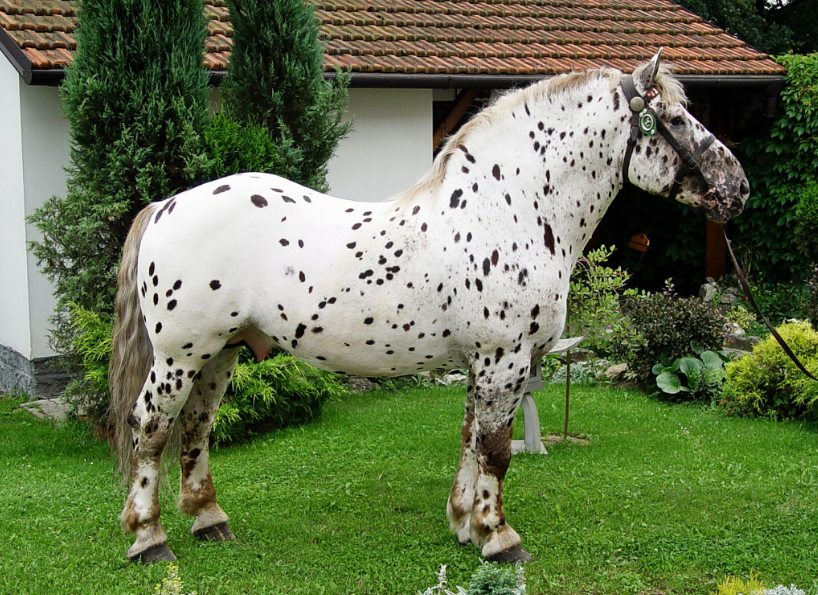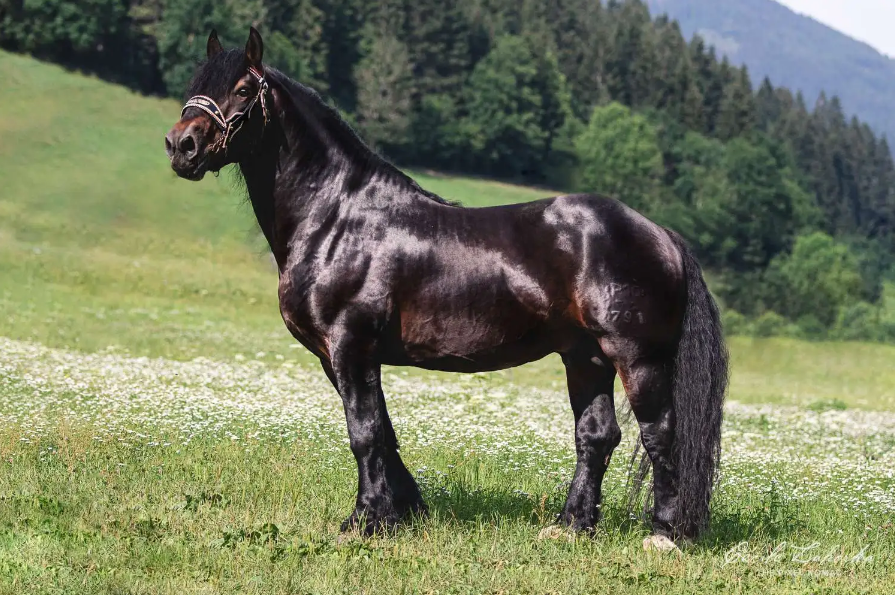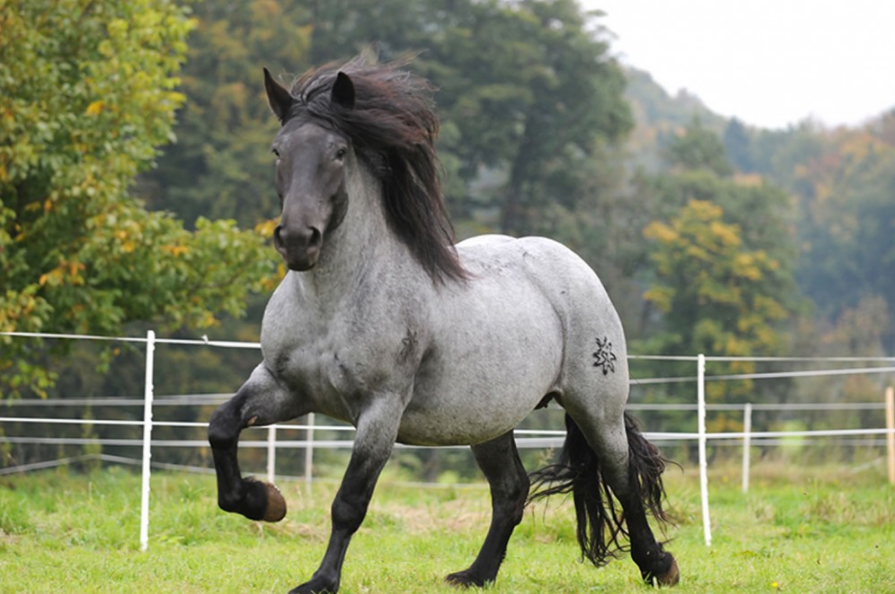Noriker
The Noriker also referred to by the name of Noricum horse is one of the draft horses that was developed within the Alpine region of Europe. Particularly, the name of the breed originates from the historical region of Noricum which encompassed parts of modern-day Austria as well as southern Germany. Norikers are renowned for their endurance, strength and versatility. their long tradition of being utilized for agriculture, forestry, and transportation through the mountains in the Alps.
Some of the key characteristics of a Noriker horse include a small and strong build as well as a somewhat short and large neck, a strong and robust chest, and strong legs that feather in the center of their hooves. They usually possess a calm and peaceful behavior, making them appropriate for many jobs. The breed is available with a wide range of coat colors. These include black, bay, chestnut and Roan.
Norikers were selectively crossed over the course of centuries and their history goes back as far as Roman times. Through the years, a variety of varieties or subtypes of Noriker have been developed according to regional preferences and the intended use. Although the breed has long-standing origins and modern breeding methods aim to enhance and maintain the characteristics that have made Norikers well-suited to heavy work in alpine areas.
Noriker Health and Feeding
Like all breeds of horse The health and well-being of Noriker horses is influenced by many factors, such as environmental factors, genetics management practices, as well as nutrition. Here are a few general guidelines regarding the nutrition and health of Noriker horses:
Nutrition:
- Forage The majority of diet for a Noriker should include high-quality forage like hay or pasture. Forage contains essential fiber, that is essential to the health of your digestive system.
- Concentrates Based on a horse’s workload, age and individual requirements, additional concentrates, like grains or commercial feeds can be added for favor extra energy and protein, vitamins and minerals. The feed should be formulated to meet the particular needs of every horse.
Water:
- Access to fresh and clean water is crucial for general well-being. Horses, and especially Norikers must have continuous access to water in order to assure adequate hydration and to assist in various physiological functions.

Routine Veterinary Care:
- Regular check-ups with a veterinarian are essential to check the general health of your horse, identify any health concerns that could be present, and give vaccinations and deworming treatments whenever needed.
Dental Care:
- Dental health is vital to proper digestion. Like all horses, must have regular dental examinations and, if needed dental floatation to treat any dental problems and assure the most comfortable and efficient chewing.
Exercise and Turnout:
- Regular exercise and participation in turnout is essential to the mental and physical health for Noriker horses. Turnout that is adequate allows natural movement and social interaction. It aids in preventing overweight and behavioral problems.
Shelter:
- Create a appropriate shelter to shield Norikers from the extreme weather conditions, no matter if it’s intense sunshine, heavy rain, or frigid temperatures.
Parasite Control:
- Create a program for controlling parasites to deal with external and internal parasites. Talk to a vet to determine the best deworming program.
Monitoring Body Condition:
- Monitor the condition of the body in Noriker horses in order to assure they’re maintaining an adequate weight. Change feeding habits accordingly to avoid obesity or malnutrition.
Environmental Considerations:
- Change management strategies to suit the particular environmental conditions under the environment in which animals are housed, particularly taking into account the alpine roots of the breed Noriker.
Noriker Care and Grooming
The care and grooming of Noriker horses is a series of routine maintenance tasks that assure their health, comfort and appearance.
Here are some of the most important grooming and care practices that are appropriate for Noriker horses:
Daily Check-ups:
- Conduct a daily visual inspection to look for signs of illness, injury, or unusual behavior. Be aware of the horse’s attitude as well as gait and general condition.
Hoof Care:
- Cleaning the hooves on a regular basis to eliminate any dirt and check for signs of thrush or hoof-related infections, or thrush. Regularly trim the hooves by a farrier in order to ensure the proper balance of hoofs.
Brushing and Grooming:
- Clean the horse’s coat frequently to get rid of dirt as well as loose hair. This keeps the coat clean and healthy, and also improves circulation. Make use of grooming tools that are appropriate, such as curry combs dapper brushes as well as body brush.
Mane and Tail Care:
- The mane should be brushed and detangled and tail to stop matting and to reduce the possibility of hair breaking. Some horse owners opt to tie or wrap the mane for aesthetic or practical reasons.
Bathing:
- Wash your horse whenever required, particularly after a long period of exercise, to wash away dust and sweat. Make use of conditioners and shampoos for horses to keep your coat healthy.
Fly Control:
- Use fly-control measures Take measures to control fly infestations, for example together sprays for fly, as well as masks for fly, as well as providing shelters in order to lessen the irritants caused by flies as well as other insects.
Blanketing:
- Make use of blankets as needed to safeguard your horse from harsh weather conditions, especially in wet or cold conditions. Make sure that the blankets are fitted correctly and that they are in good working order.

Dental Care:
- Make sure to schedule regular dental check-ups as well as the floating (filing the sharp edge of the tooth) to warrant the proper chewing process and avoid dental issues.
Vaccinations and Deworming:
- Follow a veterinarian-approved vaccination schedule and deworming program to protect the horse from common diseases and parasites.
Social Interaction:
- Horses are social creatures, and allowing them to engage in interactions with other horses is beneficial to their mental wellbeing. Be sure that your horses are provided with a sufficient turnout times.
Training and Exercise:
- Regularly engage in workout and training activities to keep your Noriker healthy and mentally active. This could include riding, groundwork or other activities that are based on the specific horse’s requirements and capabilities.
Nutritional Management:
- Keep track of the horse’s diet, altering it as necessary in light of factors like workload, age and overall health. Make sure the horse has access to clean, healthy water in all times.
Veterinary Care:
- Regularly attend veterinary checks and take skillful assistance immediately if health concerns arise.
FAQs
What exactly is an Noriker horse?
- A Noriker is draft horse breed that was developed from the Alpine region of Europe and in particular, in areas which were once part of the historic region of Noricum. They are renowned for their ability and strength, Norikers have been traditionally employed in agriculture or forestry work, as well as transport in mountains.
What’s the main traits for Noriker horse breeds?
- Norikers generally have a slim and muscular physique with a long and slender neck and a chest that is well-developed, and solid legs that have feathers on the hooves. They are available in several coat colors, such as black, bay, chestnut and the more popular roan.
The history of the Noriker breed?
- The background of Noriker horses goes up to Roman times. Through the ages they were selectively bred throughout the Alpine region to boost their capability to perform well in mountains. Different subtypes or varieties of Noriker were developed in response to regional preferences and usages.
What’s the nature of Noriker horses?
- Norikers are renowned for their calm and gentle nature, which makes them appropriate for many jobs. Their calm and docile disposition as well as their willingness to get to work has contributed to their popularity as draft horses.
What’s the most common applications for Noriker horse?
- Norikers have been used historically for many different purposes such as forest work, agricultural work and transportation in the rocky Alpine terrain. Their endurance and strength makes them ideal for tough jobs.
What is the desirable way to take care of an Noriker animal?
- The care of a Noriker requires regular grooming, nutritious food along with veterinary medical care and attention to their individual requirements. Offering a appropriate space, exercise as well as social interaction are important for their health.
What kind of tasks are Noriker horses engaged in the present?
- Although Norikers are still utilized in the traditional ways like forestry work but they also play a role in many equestrian disciplines such as dressage, driving, as well as pleasure rides. A few Norikers have been kept as pets for recreational for companion animals and for recreational purposes.
How long is the life span of the lifespan of a Noriker horses?
- The life span of the Noriker horse typically is between 20 and 25 years old, however there are variations that may happen. A proper diet, care, and a healthy lifestyle can contribute to their longevity.
Do Noriker horses appropriate for novices?
- Due to their calm disposition, Noriker horses can be appropriate for those who are new to the sport, particularly when properly trained and handled. However, the individual temperament of each horse is different and it is important to take into consideration the unique traits for each individual horse.
Does it allow Noriker horses be found in different climates?
- The Noriker horse has traditionally thrived in alpine conditions They can be adapted to different climates. A proper shelter and management system are vital to ensure their wellbeing in all weather conditions.






